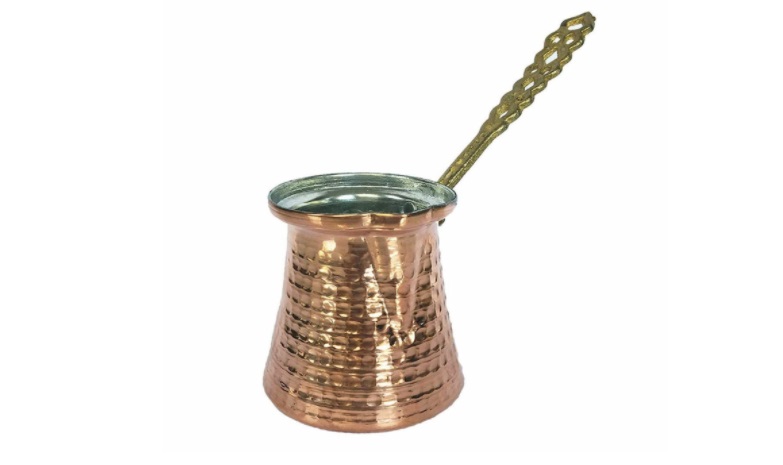
Turkish coffee is more than just a drink; it’s an experience that has been cherished across generations. The unique method of brewing this rich, aromatic coffee involves a special piece of equipment known as a Turkish coffee percolator. Unlike standard coffee-making methods, Turkish coffee percolation is an art that combines finely ground coffee beans with water and sugar (optional) and sometimes spices, bringing them together in a delicate dance of heat and timing.
The percolator, traditionally known as a cezve or ibrik, is central to this process, ensuring that the coffee is brewed to perfection with its distinctive foam and strong flavor. This piece of equipment is key to capturing the essence of Turkish coffee, making it an indispensable tool for enthusiasts of this traditional beverage.
Key Takeaways
- Choosing the Right Equipment: The selection of a Turkish coffee percolator affects the brew’s quality. Material, size, and design play crucial roles.
- Understanding the Brewing Process: Mastering Turkish coffee requires familiarity with its unique brewing technique, which emphasizes a slow cooking process to achieve the perfect foam.
- Coffee Grind Size Matters: For authentic Turkish coffee, the coffee beans must be ground to a very fine powder, finer than what is used for espresso.
- Cultural Significance: Brewing Turkish coffee is a tradition steeped in history, reflecting centuries of coffee culture.
- Serving and Enjoyment: True to tradition, Turkish coffee is best enjoyed slowly, allowing one to savor its rich flavors and aromas.
The History of Turkish Coffee
Turkish coffee’s journey began over five centuries ago, becoming one of the most influential beverages in the world. Its roots trace back to the Ottoman Empire, where it quickly became a symbol of hospitality and social interaction. The coffee made its way to Europe in the early 1600s, introduced by Turkish merchants, and transformed into a valuable trade commodity. Turkish coffee wasn’t just a drink; it was a cultural phenomenon, influencing not only how coffee was enjoyed but also the social rituals surrounding it.
The preparation and consumption of Turkish coffee have remained largely unchanged through the ages, preserving the method’s authenticity. It’s served with water to cleanse the palate, followed by the coffee itself, which is enjoyed slowly to appreciate its full flavor. Traditionally accompanied by Turkish delights or lokum, the serving of Turkish coffee is a gesture of friendship and hospitality.
Types of Turkish Coffee Percolators
In the world of Turkish coffee, the percolator, or cezve, plays a starring role. These special pots are designed to brew coffee in the unique Turkish style, and they come in various types to suit every preference and situation.
Stovetop Models: The traditional and most commonly used type, stovetop percolators are usually made from copper or brass, materials that conduct heat evenly for a consistent brew. These pots have a wide bottom, a narrow neck, and a long handle to prevent burns over an open flame. The art of using these involves managing the heat to avoid boiling over, thus preserving the coffee’s delicate flavors.
Electric Models: For those who appreciate modern convenience, electric Turkish coffee percolators automate the brewing process. These devices regulate temperature and timing, making it easier to achieve the perfect cup without guesswork. While they may lack the traditional charm of stovetop models, electric percolators are a boon for busy enthusiasts seeking authenticity without the hassle.
Each type of percolator impacts the brewing process differently, with stovetop models offering a more hands-on experience that many purists prefer, while electric models provide consistency and convenience. The choice between them often boils down to personal preference and lifestyle.
Selecting the Right Turkish Coffee Percolator
Choosing the right Turkish coffee percolator is an essential step in mastering this ancient brewing method. Here are several factors to consider:
Material: Copper is the gold standard due to its excellent heat conductivity, which allows for precise temperature control. Brass and stainless steel are also popular, offering durability and ease of maintenance.
Size: Turkish coffee is traditionally served in small amounts, so percolators typically range from single servings to larger models capable of brewing for a group. Consider your typical serving size when choosing.
Design: Beyond functionality, the aesthetic appeal of a Turkish coffee percolator adds to the overall experience. From simple and sleek to ornately decorated, the design you choose can reflect your personal style or complement your kitchen decor.
Top Percolator Models: Recommendations include the CopperBull Hammered Turkish Coffee Pot for its traditional design and heat distribution properties, and the Silk Road Trade’s cezve, appreciated for its handmade craftsmanship and durability. For those leaning towards convenience, electric percolators like the Beko Turkish Coffee Maker offer programmable settings for effortless brewing.
Brewing Turkish Coffee: A Step-by-Step Guide
Brewing Turkish coffee is an art that combines simplicity with a rich tradition. Here’s how to do it, ensuring each cup has the perfect foam and flavor:
- Measure Your Ingredients: For every Turkish coffee cup (approximately 2 oz of water), use one heaped teaspoon of finely ground coffee. Sugar is optional and to taste.
- Mix in Your Percolator: Combine water, coffee grounds, and sugar (if using) in your Turkish coffee percolator. Do not stir after placing it on heat, as this will affect the foam formation.
- Heat Slowly: Place the percolator over low heat. This slow heating process is crucial for developing the foam. Watch closely as it heats to prevent boiling over.
- Wait for the Foam: As the coffee heats, a dark foam will begin to form. Right before it boils, remove the percolator from the heat. Some prefer to scoop some foam into each cup at this stage.
- Serve Immediately: Pour the coffee into cups, allowing the foam to rise to the top. Serve with water to cleanse the palate before enjoying the coffee.
Grind Size and Its Impact on Turkish Coffee
The grind size is pivotal in Turkish coffee for achieving the desired strength and texture. The coffee beans should be ground to a very fine powder, finer than what is used for espresso. This fine grind is crucial for two reasons:
- Flavor Extraction: The ultra-fine grind increases the surface area in contact with water, allowing for maximum flavor extraction without needing to pressurize the brew.
- Texture: Turkish coffee is known for its thick, velvety texture. A finer grind contributes to this characteristic body, as well as the signature foam on top.
FAQs
Can Turkish Coffee Be Made in a Regular Coffee Maker?
Not really. Traditional Turkish coffee requires a very fine grind and a specific brewing method to create its signature foam and concentrated flavor. Regular coffee makers don’t offer the necessary control over temperature and brewing time needed for authentic Turkish coffee. However, you can still use Turkish ground coffee in an espresso machine or a Moka pot for a similar, though not identical, experience.
How Is Turkish Coffee Traditionally Served?
Turkish coffee is served in small cups, similar to espresso cups, immediately after brewing to enjoy its warmth and rich foam. It’s traditionally accompanied by a glass of water to cleanse the palate before drinking the coffee. Sweets like Turkish delight or chocolates are also common accompaniments, enhancing the overall experience.
What Is the Best Way to Store Turkish Coffee?
Keep Turkish coffee in a cool, dark place in an airtight container. Because it’s ground so finely, it can easily absorb moisture and odors, which can affect its taste. It’s best consumed within a few weeks of grinding to enjoy its full flavor.
Final Thoughts
Exploring the art of brewing Turkish coffee unveils a world of rich traditions and meticulous craftsmanship. From selecting the perfect percolator to mastering the fine grind size, every step is a testament to the culture’s reverence for coffee. While it may seem daunting at first, the process of making Turkish coffee is a rewarding journey that offers a deeper appreciation for this ancient beverage.









